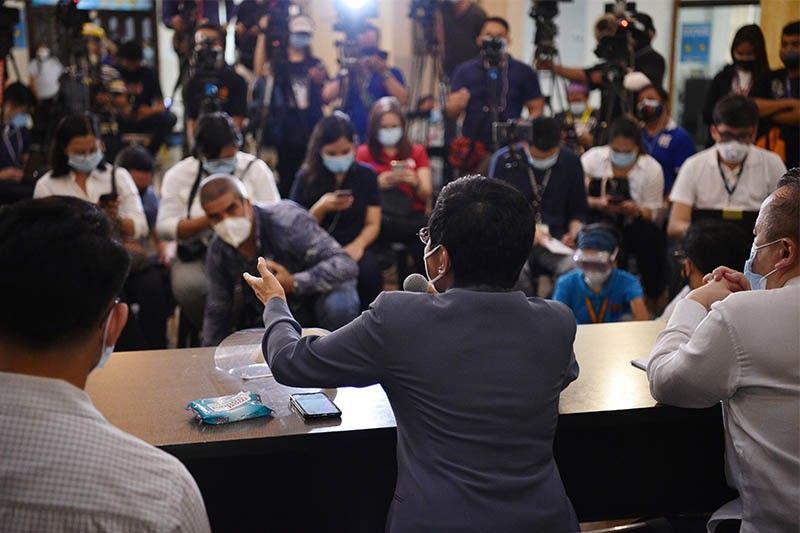Ressa, Santos appeal cyber libel conviction

MANILA, Philippines — Rappler CEO Maria Ressa and former Rappler researcher Reynaldo Santos Jr. sought the reversal of the Manila court’s conviction on cyber libel, citing alleged errors in the ruling.
In a 132-page motion for partial reconsideration filed Monday, Ressa and Santos—through the Free Legal Assistance Group—said the court erred in finding them guilty of cyber libel.
Manila Regional Trial Court Branch 46 Judge Rainelda Estacio-Montesa convicted Ressa and Santos on Cybercrime Prevention Act of 2012 or cyber libel. The court sentenced Ressa and Santos to the indeterminate penalty of imprisonment ranging from six months and one day of prision correccional as minimum to six years of prision correccional as maximum.
In filing their appeal, Ressa and Santos only sought to reverse the portion in the ruling convicting them of cyber libel but no reconsideration was filed on the part that Rappler Inc. was exonerated from criminal liability.
EXPLAINER: Fresh cybercrime ruling highlights old problem of criminal libel
On republication
The issue on republication is one of the main points legal groups questioned on the ruling.
The article central to the case is a May 2012 story and was updated on February 2014. DOJ prosecutors said this counted as multiple publication, and the court held that this update—Rappler said it was just to correct the “evation” to “evasion”—a “republication.”
Montesa held that with an updated story published on the site, the May 2012 article “can no longer be found” and “only the 19 February 2014 version presently exists,” the court said.
Ressa and Santos said there has been no proof of “any alleged republication presented, whether as a legal concept, an alleged element of the offense, or as an objective reality by the prosecution.”
They also pointed out that “’re-publication’ is not an element of cyber libel.” Assuming that there is “republication” as a legal concept, the prosecution still failed to prove that Ressa and Santos “willfully, unlawfully, and knowingly re-published” the assailed article.
They also pointed out that the court “did not even bother to cite any shred of support of its unilateral statement” that the update of the article counts as republication.
“The absence of any such reference cannot be trivialized or shrugged off because of the constitutional command that ‘(n)o decision shall be rendered by any court without expressing therein clearly and distinctly the facts and the law on which it is based,’” the motion read.
On prescriptive period
Another issue is on the prescriptive period—the time to bring forth legal action—in the case.
In convicting Ressa and Santos, the court explained that since the anti-cybercrime law does not provide its own prescriptive period, then the provision of the law on prescriptions for violations penalized by special acts would apply.
The court said that this means that the penalty of cyber libel is “one degree higher” than that of ordinary libel. It also looked at the penal provision of cyber libel.
But Ressa and Santos countered the court’s finding that there is no prescriptive period stated on the Cybercrime Prevention Act. “There is a specific prescriptive period provided. It is in Article 90 of the Revised Penal Code, as amended by RA 4461 [Prescriptive Period for Libel and Other Similar Offenses...],” the motion read.
They also reiterated that cyber libel is not a new offense, as such the one-year prescription period under Article 355 (Libel) of the Revised Penal Code should apply.
Ressa hits ‘unbecoming’ wording in the ruling
Ressa and Santos prefaced their appeal with a statement saying the court, in arriving at the decision, “resorted to language that borders on the sarcastic and, at times, crosses over to the partial.”
In the motion, they went on to call out the court branding its factual defense that Ressa is an executive editor and not an editor-in-chief as a “scheme” and “clever ruse to avoid liability.”
But they stressed that there is no basis for such statement.
“The court’s role in the trial is to determine malice, not make malicious statements, Ascribing an underhanded and even unlawful motive—without assertion or proof—is malicious. It is utterly contemptuous and unbecoming of a judge,” they added.
The legal community perceived this as a test case to the fairly young Cybercrime Prevention Act. Press freedom advocates meanwhile said the high-profile case highlights the problem in criminalization of libel, and its continued use as a tool to keep journalists in line.
- Latest
- Trending
































